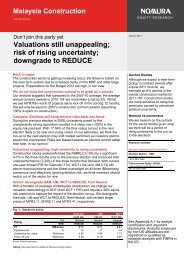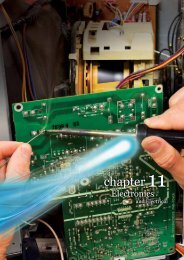Download PDF - ETP - Pemandu
Download PDF - ETP - Pemandu
Download PDF - ETP - Pemandu
You also want an ePaper? Increase the reach of your titles
YUMPU automatically turns print PDFs into web optimized ePapers that Google loves.
<strong>ETP</strong> ANNUAL REPORT 2011<br />
A key achievement in 2011 is seeing lives transformed in<br />
the Small Retailer Transformation (TUKAR) programme<br />
which modernises traditional sundry shops. To date, 519<br />
sundry shops across Malaysia have been modernised, with<br />
excited retailers reporting an average 30 per cent increase<br />
in sales. In addition, 55 workshops were transformed<br />
under the modernization of automotive workshop (ATOM)<br />
programme and we will continue to further expand this<br />
initiative in 2012.<br />
Within the 1Malaysia Mall initiative, we are making inroads<br />
overseas as we seek to export our skills and products. We are<br />
currently in discussions with the Chinese and Vietnamese<br />
governments to develop malls in these two countries. We<br />
are also exploring similar opportunities in high growth<br />
potential countries such as India, Indonesia and Sri Lanka,<br />
with an increasing burgeoning middle class. We are pleased<br />
to say that the feasibility study is completed and the report<br />
to the Government will be ready in March 2012.<br />
Palm Oil and Rubber<br />
To capture the growing global demand for palm oil, we<br />
are focused on two strategic thrusts: improving upstream<br />
productivity and downstream expansion. There are eight<br />
EPPs to deliver RM178 billion in GNI and create 123,400 new<br />
jobs by 2020. The increased productivity is also expected to<br />
reduce Malaysia’s dependence on foreign labour.<br />
In the upstream sector, yield is up 19.73 tonnes per hectare<br />
compared to 18.03 in 2010. Oil extraction rate has also<br />
increased from 19.7 per cent in January to an average of<br />
20.35 per cent in 2011.<br />
In oleo chemicals, four companies have committed some<br />
RM1.3 billion. These include Kuala Lumpur Kepong Berhad,<br />
Emery Oleochemicals Group, ICM Speciality Chemical Sdn<br />
Berhad and IOI Oleochemical Industries Berhad. To develop<br />
health-based products, Malaysia is investing some RM20<br />
million in six clinical trials in the US, Singapore and Malaysia<br />
seeking medical breakthroughs by using tocotrienols in<br />
palm oil.<br />
In the rubber industry, a dedicated lab was run at the<br />
end of 2010; four EPPs have been identified to increase<br />
productivity, ensuring sustainability, winning more market<br />
share for latex gloves and introducing new rubber products.<br />
Collectively, these four EPPs are to deliver RM28.4 billion in<br />
incremental GNI.<br />
12<br />
Tourism<br />
By 2020, the Tourism NKEA will contribute to RM66.7 billion<br />
in incremental GNI. To achieve this ambitious target, we<br />
have identified 12 EPPs across five themes: affordable<br />
luxury; nature adventure; family fun; events, entertainment,<br />
spa and sports; and business tourism.<br />
The highlights include the opening of Malaysia’s first<br />
premium outlet; the RM150 million Johor Premium Outlet<br />
which is a Joint Venture between Genting Group and<br />
Simon Property Group, and MyCEB’s (Malaysia Convention<br />
and Exhibition Bureau) success in securing 49 events with a<br />
projected economic impact of RM780 million.<br />
In addition, efforts to encourage investments in four-star<br />
and five-star hotels are progressing well with more than<br />
RM1.4 billion investments in three new hotels. KL will see<br />
two: St. Regis Kuala Lumpur which will open its doors in<br />
2014, and the Majestic Kuala Lumpur which will be fully<br />
operational in December 2012. Also operational in 2012 is<br />
the Gaya Island Resort on Pulau Gaya.<br />
Electrical and Electronics<br />
Our strategy is to focus on four target sub-sectors chosen<br />
based on attractiveness in terms of growth and size<br />
(semiconductors, light emiting diodes (LEDs), solar and<br />
industrial electronics, and home appliances) and four<br />
geographical clusters (Northern Corridor, Greater KL/KV,<br />
Johor, and Sabah and Sarawak). A total of 15 EPPs, business<br />
opportunities (including multiplier effect) and baseline<br />
growth will contribute RM90.1 billion to GNI by 2020.<br />
The focus for the year was in strengthening the enablers<br />
to expedite the multiplier effects. One of the sector’s major<br />
accomplishments is in establishing capacity building<br />
enablers. These include wafer fab equipment refurbishment<br />
services in Kulim, LED test and certification services in Bayan<br />
Lepas, and industrial utilities infrastructure in Samalaju,<br />
Sarawak. Industry players are able to leverage on these<br />
enablers to expand their businesses.<br />
We also focussed on structural reforms. With the intention<br />
to ease the entry of Malaysian entrepreneurs and their<br />
innovations further into the global marketplace, the<br />
Malaysian Investment Development Authority (MIDA)<br />
was corporatised and the Malaysian Productivity Centre<br />
restructured. In addition, Agensi Inovasi Malaysia was<br />
established to drive innovation in Malaysia, inspiring a new<br />
generation of innovative entrepreneurs.








